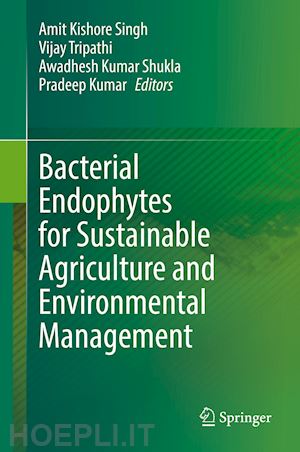
Questo prodotto usufruisce delle SPEDIZIONI GRATIS
selezionando l'opzione Corriere Veloce in fase di ordine.
Pagabile anche con Carta della cultura giovani e del merito, 18App Bonus Cultura e Carta del Docente
This book is a comprehensive account of recent advances in the endophytic research. It covers recent perspective of endophytic research, molecular diversity, bioprospecting of novel genes using high throughput molecular techniques, and most importantly application of endophytes in practicing sustainable agriculture. Endophytic micro-organisms are mysterious living component associated mutually with plant roots and soil microbes. Various endophytic bacteria have attracted considerable attention for their ability to promote plant growth through direct mechanisms or by acting as biocontrol agents. Endophytes also find use in biocontrol, medicine, agriculture and food industry. This is a useful reading for the student of agriculture, environmental microbiology and biotechnology.
Dr. Amit Kishore Singh is currently working as Assistant Professor (Botany) in Bhagalpur National College, Bhagalpur. He obtained his doctoral thesis award while working on Bt Brinjal associated microflora from Banaras Hindu University, Varanasi, India. Then after, he gained his postdoctoral research from Department of Post harvest Science at Agricultural Research Organization, Israel. In the span of more than eight years he has been actively engaged in on various aspects of plant-microbe interactions and published research and review articles in journals of international repute. Currently, he has edited five books based on PGPR applications in sustainable research. His basic research interest includes rhizosphere associated microbial dynamics, host-pathogen interactions, and microbial applications for sustainable environment. During his research career he has published more than twelve research articles, ten book chapters and recognized his research work at international level. He has been felicitated by several by fellowships and awards like CSIR- NET JRF, CSIR SRF, Best poster presentation and ARO post-doctoral fellowship. Dr. Singh is life time member of the Association of Microbiologists of India (AMI) and Biotech Research Society, India (BRSI).
Dr. Vijay Tripathi is currently working as an Assistant Professor at the Department of Molecular and Cellular Engineering, Sam Higginbottom University of Agriculture, Technology and Sciences, Prayagraj, India. He was previously awarded an ARO Post Doctoral Fellowship at the Department of Soil, Water, and Environmental Science, Agricultural Research Organization, Bet Dagan, Israel. He has also received two prestigious postdoctoral fellowships (Indo-Israel Government Fellowship and PBC Outstanding Post Doctoral Fellowship) to work as a postdoctoral fellow at the Institute of Evolution, University of Haifa, Israel. Dr Tripathi began his research career as a doctoral student at the Centre of Bioinformatics, University of Allahabad, India. During his doctoral thesis work, he was also awarded a MUIR fellowship and visited the University of Cagliari, Italy. He has published more than 40 research and review papers in reputed National and International journals, 09 book chapters, and edited 02 books. He has received the Early Career Research grant from SERB, Government of India, and Co-PI of GlobalStar-DBT, India sponsored project.
Awadhesh Kumar Shukla
Dr. Awadhesh Kumar Shukla is currently working as Assistant Professor (Botany) at K.S. Saket P.G. College, Ayodhya, Uttar Pradesh, India. He obtained his doctoral degree in Botany while working on Biodegradation of trichloroethylene using bacterial community from Banaras Hindu University, Varanasi, India. Then after, he has been awarded CSIR- Research Associate, New Delhi and worked as postdoctoral research from Department of Botany, Banaras Hindu University, Varanasi, India. After completion further, he has been also awarded Dr. D.S. Kothari Postdoctoral fellowship (higher fellowship category) by UGC. In the span of more than 10 years he has been actively engaged in on various aspects of plant-microbe interactions, exploitation of microbial community for removal of xenobiotics and published more than dozens of research and review articles in journals of international repute to his credit. His basic research interest includes rhizosphere associated microbial community and their potential utilization in environmental cleanup and sustainable agriculture. During his research career he has published more than twelve research articles, more than six book chapters and his research work gained recognition at international level. He has been felicitated with several academic fellowships and awards like Young Scientist Award, CSIR-RA, UGC-Dr. D.S. Kothari postdoctoral fellowship, UGC-NET-JRF, CSIR- NET JRF, CSIR SRF, Dr. Shukla is life time member of the Association of Microbiologists of India (AMI) and Biotech Research Society, India (BRSI).
Dr. Pradeep Kumar is currently working as an Assistant Professor in the Department of Forestry, NERIST, Nirjuli, India. He served as an Assistant Professor at the Department of Biotechnology, Yeungnam University, South Korea. He was awarded PBC Outstanding Post-Doctoral Fellowship and work for more than three years at the Ben Gurion University of the Negev, Israel. Dr. Kumar research interests are biocontrol and PGPR, nanotechnology, phytochemistry, bioremediation, food microbiology, phytopathology and gene expression studies. He has published more than 70 research and review articles in peer-reviewed journals, 16 book chapters and 06 edited books (Springer-Nature; Taylor & Francis Group) with total 2485 citations and h-index 24 and i10-index-35. He has been awarded Early Career Research Award from the SERB, Government of India and currently handling four projects as











Il sito utilizza cookie ed altri strumenti di tracciamento che raccolgono informazioni dal dispositivo dell’utente. Oltre ai cookie tecnici ed analitici aggregati, strettamente necessari per il funzionamento di questo sito web, previo consenso dell’utente possono essere installati cookie di profilazione e marketing e cookie dei social media. Cliccando su “Accetto tutti i cookie” saranno attivate tutte le categorie di cookie. Per accettare solo deterninate categorie di cookie, cliccare invece su “Impostazioni cookie”. Chiudendo il banner o continuando a navigare saranno installati solo cookie tecnici. Per maggiori dettagli, consultare la Cookie Policy.